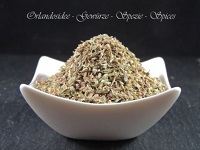
Wild Marjoram (Oregano)
Origanum vulgare — robust, herbal-citrus, savory
“Wild marjoram” commonly refers to oregano (Origanum vulgare): a Mediterranean classic with a warm, savory aroma, gentle bitterness and citrusy top notes. It shines in tomato sauces, pizzas, grilled meats and hearty vegetables. (Sweet marjoram is Origanum majorana—milder and sweeter.)
- Botany: Origanum vulgare • Family: Lamiaceae
- Part used: leaves (dried)
- Profile: savory, slightly bitter, resinous herbs with citrus lift
- Best for: pizza, tomato sauces, grilled meats, legumes, roasted veg
Aroma & Taste
Full-bodied and savory with piney-herbal depth and a light citrus edge. Dried oregano is potent—use sparingly and build up to taste.
Culinary Uses
- Tomato dishes: finish marinara, ragù and baked pasta; sprinkle on pizza.
- Grills & roasts: rub for chicken, pork or lamb with garlic and olive oil.
- Vegetables & legumes: roast potatoes, eggplant, zucchini, chickpeas and beans.
- Dressings & marinades: whisk into vinaigrettes; add to lemon-garlic marinades.
- Herb blends: cornerstone of Mediterranean mixes and “pizza spice.”
How to Use
- Timing: add early in long-cooked sauces; for bright top notes, add a final pinch off-heat.
- Crush to release: rub dried leaves between fingers before adding.
- Fresh ↔ dried guide: about 1 tsp dried ≈ 1 Tbsp fresh (3× by volume).
Dosage & Kitchen Ratios
- Tomato sauce: 1–2 tsp dried per 1 l (4 cups) sauce.
- Rubs/marinades: 1–2 tsp per 500 g (1.1 lb) meat or veg.
- Dressings: 1/2–1 tsp per 250 ml (1 cup) vinaigrette.
Pairings
Garlic, onion, thyme, rosemary, basil, chili flakes, lemon zest; tomatoes, peppers, eggplant, potatoes; chicken, pork, lamb and cheeses.
Ingredients & Allergens
Ingredients: Wild marjoram / oregano leaves (Origanum vulgare), dried.
Allergens: none mandatory in EN labeling for this single ingredient.
Storage & Shelf Life
Store airtight, cool, dry and away from light. Best aroma within 12–18 months. Reseal promptly after use.
Substitutes & Notes
Closest swaps: sweet marjoram (O. majorana, milder—use more) or thyme (drier, woody notes—use slightly less). Adjust to taste.
FAQ
Is wild marjoram the same as sweet marjoram?
No. “Wild marjoram” usually means oregano (O. vulgare), which is stronger and more savory than sweet marjoram (O. majorana).
When should I add oregano to sauce?
Add early for rounded depth, and finish with a small pinch off-heat to refresh aroma.
How much dried equals fresh?
About 1 teaspoon dried = 1 tablespoon fresh; adjust based on intensity.
Merchant contact: Orlandosidee — Spice Shop (see site imprint for full company details). Email: info(at)orlandosidee.de



